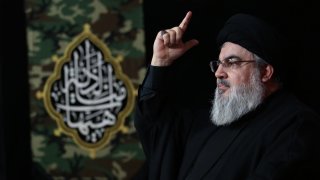Israel Attacks Hamas Leadership in Lebanon: What’s Next?
A strike against Hamas leaders in Beirut threatens to escalate into conflict between Israel and Hezbollah.
Last Tuesday, an attack on the Hezbollah controlled-Dahieh neighborhood south of Beirut resulted in the killings of top officials from the Islamist Palestinian organization Hamas. As of now, seven people are reported dead. Israel is suspected of carrying out the strike. Although Tel Aviv denies any responsibility, Hamas has declared Israel as the culprit. The targets were Hamas deputy chief Saleh al-Arouri as well as Samir Findi Abu Amer and Azzam Al-Aqraa Abu Ammar, leaders of Hamas’ armed wing—the Qassam Brigades.
Israel blamed the wing for carrying out the October 7 offensive that killed over 1200 Israelis. Will this incident change the rules of engagement between Israel and Hezbollah?
The Aftermath
People surrounded the area to get a better look at the wreckage. Medical teams and ambulances rushed to the scene to rescue the injured. Once the Lebanese army arrived, a security parameter was created to prevent further bystanders from entering the damaged roads. Hamas leader Ismail Haniyeh openly condemned the killing of Arouri, calling it an “act of terrorism.” Haniyeh has said this will not deter the group, and it “won’t be defeated after this incident.”
In a televised address, he intoned, “A movement whose leaders and founders fall as martyrs for the dignity of our people and our nation will never be defeated.”
This strike comes at a time when there is a real fear of escalation between Lebanon and Israel. Lebanese caretaker prime minister Najib Mikati condemned the killing of Mr. Arouri, saying the strike “aims to draw Lebanon” deeper into the Israel-Hamas war. Hezbollah (an ally of Hamas) has harbored Palestinian militants for years and has vowed to retaliate. A day after the drone strike, Hezbollah leader Sayyed Hassan Nasrallah gave a speech discussing the incident and is planning a second one on Friday.
Nasrallah warned, “the killing of Arouri will not go unpunished.” In the past, the Hezbollah chief has said any killing of its leaders or Hamas figures in Lebanese territory would be a red line. He went on to declare, “ we are not afraid of war.”
The group is currently in a limited border war with Israel. More than a hundred Hezbollah fighters have been killed since October 8 after it decided to join the fight on the side of Hamas.
Local Reactions
Some residents agreed to speak to the National Interest after the strike on the condition of anonymity. One young man on a motorcycle said, “This is an attack on Lebanon by Israel. This could turn into an ugly situation very quickly, and we may all pay a terrible price.” Another man from a nearby shop asked, “Why should this happen in our neighborhood? We cannot live in peace with Israel. Time and again, they show us who they are. Today it is a drone, tomorrow it could be tanks and F-16s.”
Is American Mediation Possible?
Washington plans to send presidential envoy Amos Hochstein to Beirut to deescalate the situation.
Edward Gabriel, President of the American Task Force for Lebanon, talked to TNI about the envoy’s intentions: “He is in the middle of it, and I believe he is trying to broker a buffer and ceasefire or keep the old rules of engagement intact.” But the rules have shifted. Whether or not Israel acknowledges that it ordered the hit is irrelevant. No one has any illusions that Israeli Prime Minister Benjamin Netanyahu gave the command to kill Arouri and other Hamas officials.
It is also plausible that this could happen again if Israel deems it necessary. Now, Hochstein must perform a diplomatic miracle and walk this crisis back before it becomes an open war. It will come down to a variety of factors. First, America must guarantee that Israel will not do this again —which seems difficult to believe—given the fact Washington did not provide the go-ahead for Israel to execute this drone strike. Second, there needs to be some reassurance from Hezbollah that it doesn’t go too far in its retaliation. Everything rides on the details.
Adnan Nasser is an independent foreign policy analyst and journalist with a focus on Middle Eastern affairs. Follow him on Twitter @Adnansoutlook29.
Image: Shutterstock.com.

